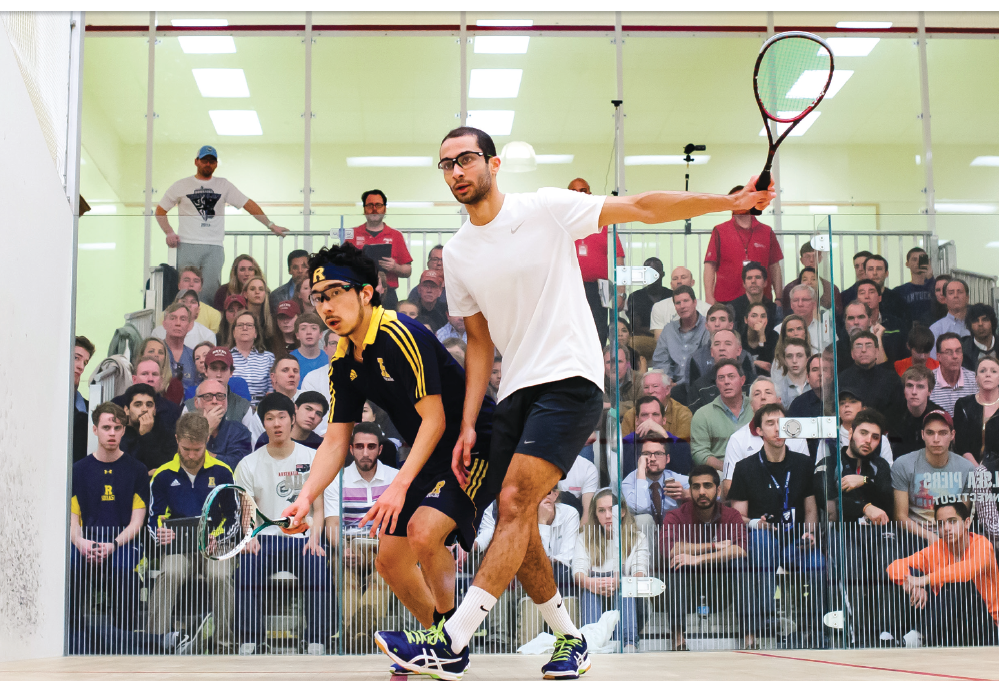
by Dent Wilkens
Photography by Michael T. Bello/mtbello.com
Kanzy El Defrawy and Ahmed Abdel Khalek entered the College Individuals Nationals with the weight of expectation squarely on their shoulders. Both players were seniors slated to graduate this spring, and were capping two of the most successful college careers in the past decade. The tournament, held at Chelsea Piers Athletic Club in Stamford, CT, would be the final matches they would play for their teams.
El Defrawy has played in the top position for Trinity College since landing there from her home in Cairo, Egypt in the fall of 2012. She was trained at the Heliopolis Club, the crucible of squash greats like Ramy Ashour, Raneem El Weleily, and two-time Intercollegiate Champion Ali Farag of Harvard University.
For her first three years of nationals, a roadblock existed for El Defrawy—Amanda Sobhy. The Harvard star Sobhy had completed her first of four undefeated college seasons in 2011-2012, and the new Bantams recruit—despite being one of the strongest players to ever enter the college game—came up short to her in each of the 2013, 2014, and 2015 finals.
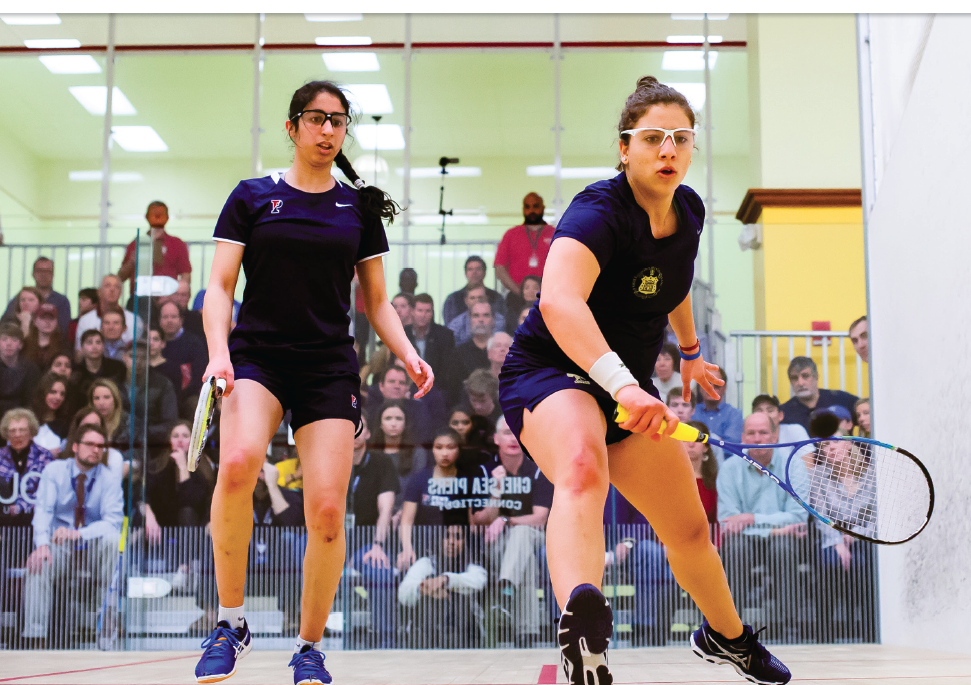
“Being in the finals three years in a row and losing each time has been one of the biggest challenges of my squash career,” said El Defrawy, “It’s not easy to lose to the same person…three years in a row.”
The Trinity program thrived with El Defrawy as its torchbearer. The team made the Howe Cup (Women’s Nationals) final three times, winning it 5-4 over Harvard in 2014. The team honored her with four consecutive MVP awards in the process. “Kanzy always projects energy, spirit, and a never-say-die attitude,” reflected Wendy Bartlett, Trinity Women’s Head Coach, “Her enthusiasm is contagious to both her teammates and those watching her.”
Abdel Khalek similarly represented Bates College in the number one position for all four years. He also hails from Cairo, but first moved to the U.S.—attending Westminster School in Connecticut—for his final two years of high school. He went undefeated at Westminster, and captured the 2011 U.S. Junior Open Boy’s Under 19 title after accepting admission to Bates.
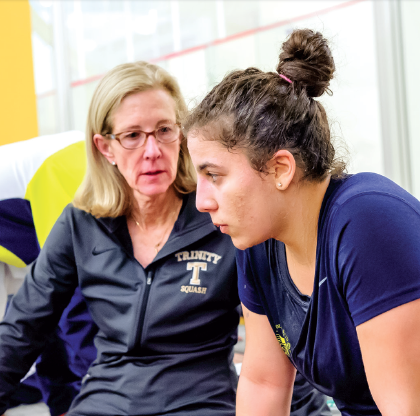
her thirty-two years at Trinity has accomplished what El Defrawy
did on the Bantam squad.
After an impressive freshman year showing in the 2013 Nationals—reaching the semifinal, losing to current U.S. Champion Todd Harrity—Abdel Khalek had to sit out the event his sophomore year due to injury. He came roaring back in 2015, winning the event in a dramatic five-game final over Columbia freshman Osama Khalifa.
El Defrawy and Abdel Khalek arrived at the 2016 Individual Nationals as the top seeds, with all eyes—and pressure—on them. Though the women’s draw no longer featured the graduated legend Sobhy, a familiar last name occupied the number two seed—freshman Sabrina Sobhy of Harvard, younger sister of Amanda and 2014 U.S. National Champion. Another freshman, the University of Pennsylvania’s Reeham Sedky, was the reigning U.S. Junior Champion and only had losses this season against Sobhy and El Defrawy.
The men’s field was similarly loaded with danger for Abdel Khalek. 2013 Champion—Amr Khaled Khalifa of St. Lawrence University, older brother of Osama—returned to the draw after being out with injury in 2015. Osama was also back, though hampered by a persistent back injury. The bottom half of the draw also featured the two stars from the University of Rochester—Mario Yanez and Ryosei Kobayashi.
El Defrawy and Abdel Khalek dealt with the pressure in opposite ways. “I was so stressed at the beginning of the season and I became obsessed with training and getting better on court,” said El Defrawy. “I felt too weighed down, and one dramatic loss [to Sabrina Sobhy in January] was enough to destroy me mentally. I switched gears and took it so easy, trained less and decided to relax. That’s when I was able to play my best squash.”
Abdel Khalek was known at Bates to dive even deeper into his training in preparation: “His mental focus, trust and faith in himself and his abilities and his physical preparation, especially for big matches, is remarkable,” said Pat Cosquer, Head Coach of Bates.
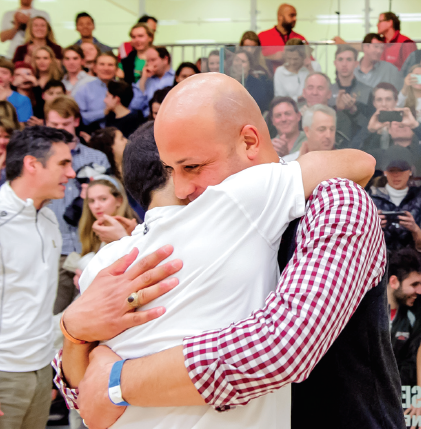
elevated the profile of the Bobcat squash program.
He would need this preparation for the difficult road through the tournament. Abdel Khalek fell two games to one down to St. Lawrence’s Moustafa Bayoumy in the quarterfinal, before winning in a dominant 11-1 fifth game. The semifinal proved to be another challenge, as Trinity’s number one Rick Penders took the first game and challenged throughout a grinding four-game match. On the bottom half of the draw, Ryosei Kobayashi surged to the final, dropping only one game (to two-seed Amr Khaled Khalifa) along the way and looking in top form.
El Defrawy’s path was smoother, as she imposed her attacking, dynamic style of play on the field. She reached the final without dropping a game, and looked calm and confident as she hunted the title that had eluded her for three years. On the other side, Reeham Sedky of Penn has looked equally dominant, also not yielding a game on her way to a finals showdown with the Trinity star.
In the end, however, both players lived up to expectation and captured the title they were seeded to win. El Defrawy shook off a 13-11 first game loss to control the next three games against the hard-hitting Penn freshman. Kobayashi threw everything he had at Abdel Khalek, but the Bates senior closed the win in four games, including the final two in overtime.
Both of their victory speeches felt like a prolonged exhale of relief after a season of pressure. Abdel Khalek made the packed crowd laugh as he thanked everyone who had helped him along the way (and everyone else he had ever met), luckily remembering in closing to thank his girlfriend who had made long trip from Maine. El Defrawy was similarly gracious in victory, acknowledging her deep gratitude for her coaches and teammates and their vocal support throughout this match, and her whole career.
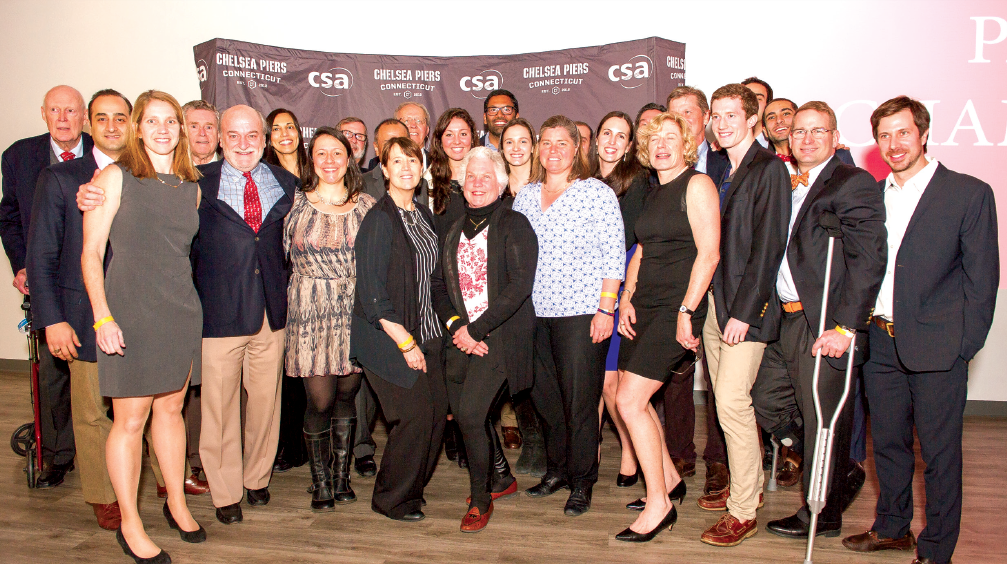
time the CSA staged the championships at a neutral site.
At the conclusion of their careers, both players leave an indelible mark on the squash programs of their respective colleges. “Ahmed’s success has exponentially elevated the exposure of our squash program,” reflected Cosquer. “While his individual career record is astonishing, the time he has spent and the effort he has made helping his teammates improve will be his lasting legacy.”
Similarly, Bartlett comments about El Defrawy: “No other player has achieved what Kanzy has in her four years as a student-athlete for Trinity. Her work ethic, love of squash, and effervescent personality will be greatly missed.”
What’s next for these two transcendent stars of the college game? Dreams as different as their approach to preparation for the Nationals: “I don’t think I’ll play professionally after college,” Khalek mused, “I think that there are so many things to experience in life other than squash.” El Defrawy takes a different, though equally passionate tack: “I’m definitely going full-time professional, it’s the ultimate dream!”


